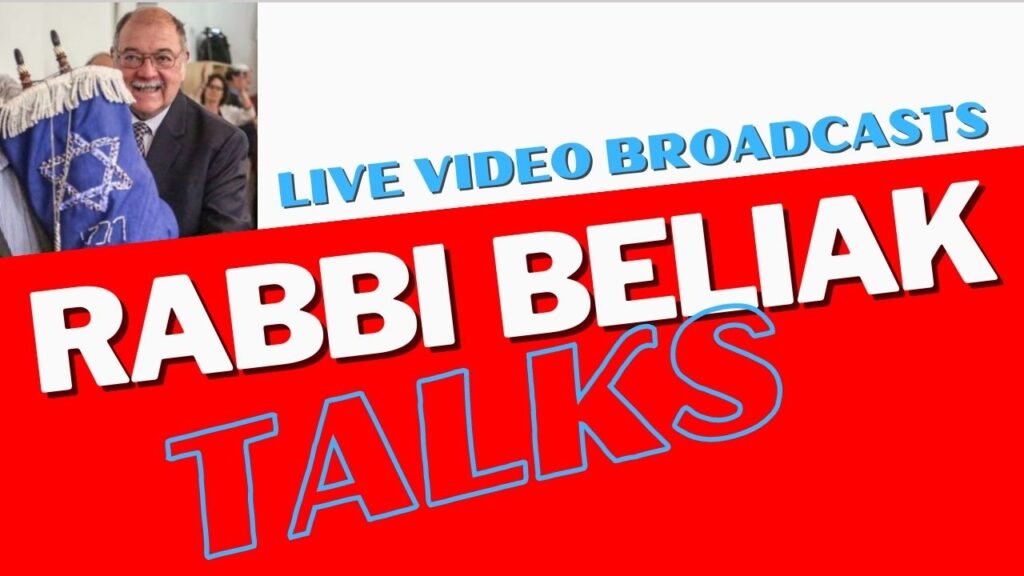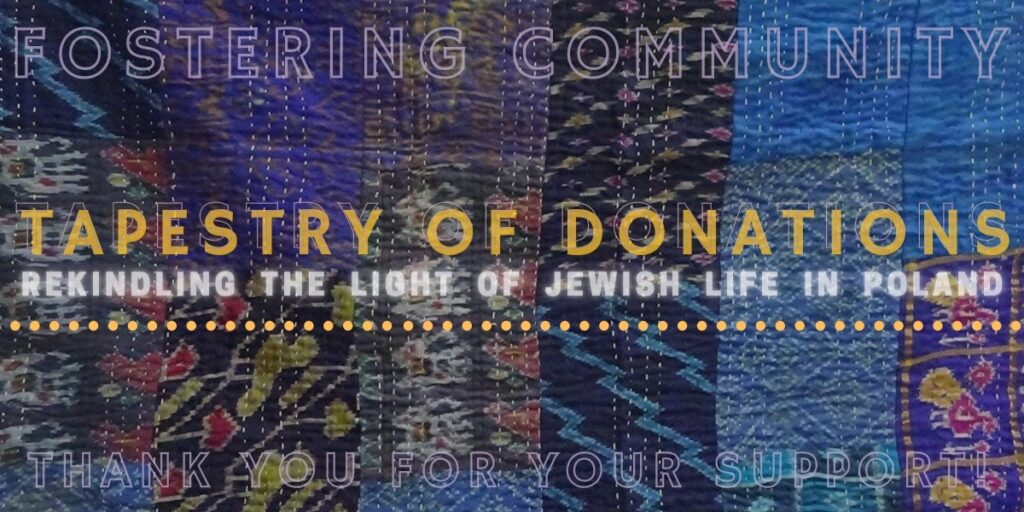“Aftermath” is a movie thriller that powerfully focuses on issues related to Jews and Catholics — and many others — in the complex world of Poland during and after World War II. This Polish made film is not a documentary but uses elements from a Polish national conversation sparked by Princeton historian Jan Gross’ historical study entitled Neighbors. The book’s disturbing findings continue to reverberate in Poland today and have surrounded this film’s theatrical release in Poland.
Rabbi Haim Beliak is the executive director of Friends of Jewish Renewal in Poland a non-profit supporting Progressive Jewish life in Poland. The Polish national umbrella organization, Beit Polska provides services and training to the emerging local synagogues. The flag ship Jewish community is Beit Warszawa which now joined by seven other communities – Beit Bialystok, Beit Poznan, Beit Konstancin, Beit Lodz, Beit Lublin, Beit Plock, and Beit Troijmiasto (Sopot, Gydinia and Gdansk). The World Union for Progressive Judaism and the European Union for Progressive Judaism are active in promoting Jewish life through Europe and especially Poland. Every year hundred of tourists to Poland join our groups for discussion, celebration of Shabbat, and sharing our Polish Jewish heritage.
Beit Polska is proud to participate in providing educational materials, lecturers, and guides for understanding the thousand year history of Jewish life in Poland. Some of our members are trained researchers helping with developing materials for family histories.
In Poland, World War II Ended in 1989
Poland is unique among the thirteen countries formerly controlled by the Soviet Union because it is carrying on a considerable struggle over its past. The Polish narrative seeks to balance its fate as a victim versus its struggle with its “dark past.” Aside from Germany, Poland is the country most focused on confronting its past. Poland’s process of national soul searching is however alternatively the most thorough going and the most in denial. Poland’s confrontation with the past by Poland’s sense of itself as both the blameless victims and its sense of integrity. Some Poles can only see themselves as victims. Some Poles can see more. All of this makes for a genuine complex national controversy between the two groupings of the so-called polityka hisoryczna (historical policy — nationalistic and even, ultra-nationalistic) versus the patriotyzm krytyczny (critical patriotism — seeking European Union acceptance and also, nationalistic). The ultimate direction of these conversations is not yet fully determined. (A key source for understanding this national discussion is Joanna Beata Michlic and Malgorzata Melchior’s essay “The Memory of the Holocaust in Post-1989 Poland: Renewal — Its Accomplishments and Its Powerlessness” in Bringing the Dark Past To Light: The Reception of the Holocaust in Post-communist Europe, edited by John-Pal and Joanna Beata Michlic (University of Nebraska Press, Lincoln 2013) During the Communist era there was little of the Holocaust taught in Polish schools. The Jewish identity of three million of the six million Poles was subsumed under the category: victims of fascism.
Jewish audiences, and many others, must first take stock of this untidy controversy in the Polish context to appreciate the courage of the film makers. The actors and filmmakers who have received death threats were not naive but could not have anticipated the extent of the vehemence of some parts of the Polish public. The Polish public’s response to the film in cinemas was heated. Curiously the DVD sales for this film in Poland is quite strong and is expected to keep growing, suggesting a different perhaps more courageous private reaction to the film.
In a BBC interview the film’s producer Dariusz Jablonski reminds us that this film can only spark a conversation but that the hard work of education is best accomplished in discussion and deeper learning. The deeper learning begins in the conversation about this movie and other important considerations.
The anger often directed at Poland by Jews does not comprehend Poland’s status as an occupied country nor does it understand the conditions and challenges that produced the largest number of acknowledged “Righteous Gentiles” (6400 Polish non-Jews who attempted to save Jews) as verified by Yad V’Shem. At the same time, Polish society has until very recently only lightly recognized the importance of Polish rescuers of Jews. In many accounts rescuers demanded to remain anonymous for fear of retaliation from their Polish neighbors. (The Crooked Mirror: A Memoir of Polish – Jewish Reconciliation by Louise Steinman and Bending Toward the Sun: A Mother and Daughter Memoir Leslie Gilbert – Lurie.)
Many uninformed people do not stop to distinguish between the systematic murder of six million Jews by the Nazis and the admittedly real anti-semitism of pre-World War II Europe including Poland. The consequences of that anti-semitism during World War II aided Nazi Germany’s plans for genocide. (Jan Grabowski, Hunt for the Jews. Betrayal and Murder in German-Occupied Poland, Indiana University Press, Bloomington & Indianapolis, 2013).
In the memory of Holocaust survivors the actions of some neighbors who applauded the early German actions against Polish Jews resonates. This behavior is more painful since some neighbors repeated and intensified their hateful actions after the World War II when the few survivors were often denied entry to their former homes and attacked in events like the Kielce pogrom in July 4, 1946 (Jan Gross Fear: Random House, New York, 2006). The fear of descendants of Jewish Poles attempting to reclaim homes and other property as portrayed in the film, “Aftermath” is a central issue of contention. Underlying this fear over re-claimed property is a sense of injustice that non-Jewish Poles express over the lack of compensation for their losses in areas that were once Poland but are now in Ukraine and Belarus. (See, Jan Gross and Irena Grodzinska Gross and their extended essay on topics of property restoration in their book, Golden Harvest: Events at the Periphery of the Holocaust.) Most Poles have little understanding of this post-World War II world as film demonstrates.
While quite searing and shocking these actions by individuals and small groups contrast to much larger reality of the systematic murder perpetrated by the Nazi Germans. Strangely, that larger specter of Nazi German mass murder is now muted in many Jewish forums.
Background of film
Gross’ work Neighbors ignited a national debate in Poland and an important English collection edited by Joanna Michlic and Anthony Polonsky, The Neighbors Respond (Princeton University Press:Princeton, 2004). For a short history of the murder of Jews by their fellow Poles in Jadwebne in 1941 and a thumbnail sketch of the controversies click here, and more substantially in Neighbors Respond.) It should be remembered that “Aftermath” is not a documentary but it is against this background that film’s controversial story line must be understood.
Historian Michael Steinlauf’s book Bondage to the Dead: Poland and the Memory of the Holocaust points to the importance of Poland’s late arrival in the discussion over World War II because of the Soviet Union’s triple role: 1) as ally of the Nazis and the murder of 22,000 Polish Army officers in Katyn (from September 1939 to June 21, 1941) 2) then, as ally of the allies after June 21, 1941 and 3) followed by “liberator” (from 1944) turned occupier culminating in the 1989-1991 emergence of a free Poland. During most of the past two hundred years preceding 1989 Poland was independent for only twenty years.
This is a “thriller” and it employs the tools of that genre; it is not a documentary. Nevertheless, because this kind of film can lead to hate it is important to guide the viewer and invite a conversation that is more historical and nuanced.
Here are some important reviews and more context:
Cineaste Reveiw and Interview with Athermath’s film director Wladyslaw Pasikowski and its producer Dariusz Jablonski
Kenneth Turan’s review of Aftermath, an excellent review.
The Jewish Daily Forward’s review by Curt Schleier.
BBC interview of Aftermath producer, Dariusz Jablonski.
This review by Fr. Dennis Kriz of Annunciata Parish in Chicago adds important perspective.
In a public debate over a controversial new Holocaust film, Poland faces up to a complicated past, by Denise Grollmus
The movie Aftermath has continued to garner attention from many quarters in the Jewish and Polish communities in America. A very fine discussion of the movie with new information about the reception of the movie in Poland is the product of an interview that Jan Jaben Eilon wrote for the Atlanta Jewish News after an interview with the Dariusz Jablonski, the film’s producer.
Additional Notes – two special audiences
My experience with audiences viewing the film “Aftermath” included Poles and Palestinians. Both of these groups were uncomfortable talking to an audience that is overwhelmingly Jewish.
Perhaps the presence of Polish non-Jews as conversations leaders will help the Poles. The “Polonia” crowd — aging Polish expats — will most likely continue to remain uncomfortable with the movie. Many believe (like some Zionists) that the Holocaust was a self-inflicted wound … they each give different reasons but they are painfully inaccurate at every turn.
The Palestinians are perhaps the most interesting group in this conversation for Jews but that is also very complex. Suffice it to report one remark by a Palestinian who said, “does this film and the rehashing of this history bring us (Jews/Israeli and Palestinians) closer to understanding? I think it makes it harder.”
I think on the whole the movie can be used “to make lemonade.” For me “lemonade” is building some bridges for reconciliation


Watch the film
http://www.poranny.pl/apps/pbcs.dll/article?AID=/20131011/BIALYSTOK/131009598